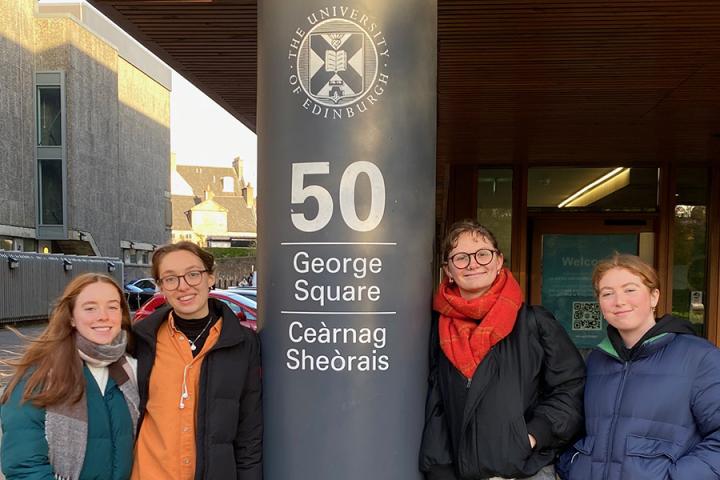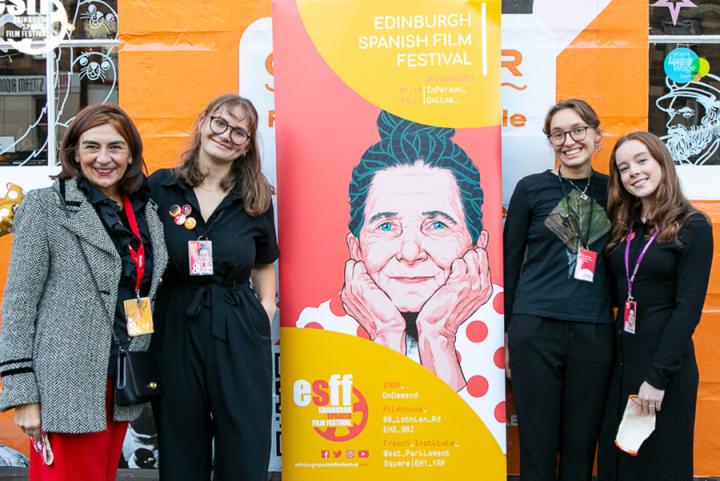Out of the classroom, into the cinema
We talk to students Lucy, Nina, Ella and Harriet about their involvement in the eighth Edinburgh Spanish Film Festival.
After moving online in 2020, the Edinburgh Spanish Film Festival (ESFF) returned in a hybrid format in 2021, giving student volunteers a range of opportunities to get involved and develop new skills.

Established in 2014, and now a regular fixture in Edinburgh's cultural calendar, the Festival showcases the best of Spanish and Latin American cinema. Marian A. Aréchaga is the Curator/Director and Patricia Rueda is the Producer; both teach in Spanish, Portuguese and Latin American Studies (SPLAS) at Edinburgh.
This year’s eighth edition of ESFF combined in-person screenings, discussions and other events at Filmhouse and the French Institute in Edinburgh with online screenings via INDY On Demand. Highlights included a special tribute to Luis García Berlanga, strands on Basque and Catalan cinema, several directorial debuts, and programmes for children and young people.
We caught up with students Lucy, Nina, Ella and Harriet, who are in different years of undergraduate study in Spanish in the School of Literatures, Languages and Cultures (LLC), to chat about what they’ve taken away from the experience of volunteering at ESFF.
Building confidence
ESFF takes place in early October which, for second year student Lucy Kyle, meant a welcome first foray into “socialising with other students and getting involved with university life properly after everything being online last year”.
Working as part of a team to plan and deliver events with venues like Filmhouse meant that she could meet new people within and beyond the University, and practice her Spanish outside the classroom.
Lucy says “Taking part in the Festival has allowed me to make contacts, both with fellow students and native Spanish speakers, and has helped to build my confidence with the language.”
“This experience has no doubt helped me with my language learning, as well as given me the push I needed to get more involved in extracurricular activities, which will help to enrich my time here at the university.”
Fun and fascinating

Now in her final year of study, Nina Butslova first heard about ESFF in her first year from Patricia (Rueda), her grammar teacher at the time.
Asked why she volunteered, Nina says “I am studying Spanish and History, so getting involved in the ESFF seemed like a perfect opportunity to practice my Spanish but also to widen my understanding of Spanish and Latin American film, culture and history.”
“I have always been interested in film, cinematography and documentaries in particular. This is something I want to pursue, as a career in the future, so volunteering at ESFF seemed perfect to improve my understanding in this sphere and gain useful skills!"
“This was my second year with the festival and as usual, it was a very fun and fascinating experience!”
Engaging younger audiences
Like Nina, Ella O’Neill is in her final year of study (Spanish and English Literature) and is looking ahead to life after university.
Working alongside Social Media Manager, Tallulah McCowan Hill, Ella says “I was really fortunate to work on the social media for the Festival and, as it was a very small team, I was able to see our ideas through from start to finish.”
“A big part of the role was how to strategically publicise the festival, focusing on getting a younger audience interested in foreign cinema; I learnt how to use our channels to continue to keep up the awareness of the event.”
“It was really fun to develop my creative skills, using Canva, to create bold graphics to catch attention as well!”
A nerdy thrill
The honours years at university (Years 3 and 4) are particularly good for developing research and analysis skills, and final year student Harriet Bunnett (French and Spanish) was able to transfer these skills to ESFF during the planning stage, sourcing information on films ‘On this side of the world’ and ‘The People Upstairs’.
Speaking about bringing the Festival to fruition, Harriet says “There was an amazing energy at the Festival this year. I loved seeing the films I had researched in April finally get screened and getting to talk to the teams who had made them!”
“I felt really involved and could see my contributions in front of my eyes at the Festival and in its social media, such as being asked to transcribe and translate the interviews with the directors - a bit of a nerdy thrill for a languages’ student.”
“For me, the biggest moment was getting to stand alongside Marian (the curator) at the opening screening and translating her speech! I miss it already.”
Are you interesting in studying in LLC?
Our four-year undergraduate degrees include a range of single and joint honours programmes in Spanish, Portuguese and Latin American Studies (SPLAS). These programmes are now open for application through UCAS for entry in September 2022.
Find out more about undergraduate study in SPLAS
Our postgraduate programmes include taught masters degrees in Film Studies, Film, Exhibition & Curation, and Intermediality, and research-led degrees in SPLAS. These programmes are now open for application through the University’s online system for entry in September 2022.
Find out more about postgraduate study in LLC

